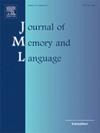Only case-syncretic nouns attract: Czech and Slovak gender agreement
IF 3
1区 心理学
Q1 LINGUISTICS
引用次数: 0
Abstract
Attraction effects in the comprehension of ungrammatical sentences have long been observed for number and gender agreement across many languages. These prolific findings have led researchers to claim that attraction effects are universal. However, recent evidence from Czech has shown that number agreement attraction is either non-existent in the language or negligible in size. We aimed to test whether this is also the case for gender agreement and to explore the role of case syncretism in the emergence of attraction effects. Crucially, we evaluated the predictions of the cue-based retrieval model in light of the resulting estimates. Across three self-paced reading experiments, two on Czech ( = 172, = 255) and the other on the closely related Slovak ( = 119), gender attraction in ungrammatical sentences was attested only with case-syncretic attractors. No differences between grammatical conditions were found. Based on computational modelling estimates, we argue that these empirical results contradict the predictions of the classic cue-based retrieval model but are compatible with the repair-by-retrieval account.
只有格合名词吸引人:捷克语和斯洛伐克语的性别一致
在许多语言中,对于数目和性别的一致性,在理解不合语法的句子时,吸引效应早已被观察到。这些丰富的发现使研究人员声称吸引力效应是普遍存在的。然而,最近来自捷克的证据表明,数字协议吸引力在语言中要么不存在,要么可以忽略不计。我们的目的是测试性别一致性是否也是如此,并探索案例融合在吸引力效应出现中的作用。至关重要的是,我们根据结果估计评估了基于线索的检索模型的预测。在三个自定节奏的阅读实验中,两个是捷克语(N1 = 172, N3 = 255),另一个是密切相关的斯洛伐克语(N2 = 119),不符合语法的句子中的性别吸引仅用格合成吸引子来证明。没有发现语法条件之间的差异。基于计算模型估计,我们认为这些实证结果与经典的基于线索的检索模型的预测相矛盾,但与检索修复帐户兼容。
本文章由计算机程序翻译,如有差异,请以英文原文为准。
求助全文
约1分钟内获得全文
求助全文
来源期刊
CiteScore
8.70
自引率
14.00%
发文量
49
审稿时长
12.7 weeks
期刊介绍:
Articles in the Journal of Memory and Language contribute to the formulation of scientific issues and theories in the areas of memory, language comprehension and production, and cognitive processes. Special emphasis is given to research articles that provide new theoretical insights based on a carefully laid empirical foundation. The journal generally favors articles that provide multiple experiments. In addition, significant theoretical papers without new experimental findings may be published.
The Journal of Memory and Language is a valuable tool for cognitive scientists, including psychologists, linguists, and others interested in memory and learning, language, reading, and speech.
Research Areas include:
• Topics that illuminate aspects of memory or language processing
• Linguistics
• Neuropsychology.

 求助内容:
求助内容: 应助结果提醒方式:
应助结果提醒方式:


